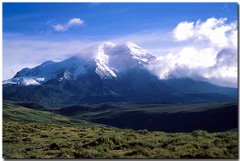from Jane Lampman at the ChristSciMon... this is good stuff... and extraordinarily scary too:
In material given to conference attendees, the Rev. D. James Kennedy, Coral Ridge pastor wrote: "As the vice-regents of God, we are to bring His truth and His will to bear on every sphere of our world and our society. We are to exercise godly dominion and influence over our neighborhoods, our schools, our government ... our entertainment media, our news media, our scientific endeavors - in short, over every aspect and institution of human society."
This is the 10th conference to spread this "cultural mandate" among Christians, and although the church's pastor couldn't speak due to illness, others presented the message intended to rouse the conservative faithful, eager to capitalize on gains won during the November election.
This melding of religion and politics, Christianity and patriotism, makes many uneasy, particularly those on the other side of the so-called culture war, who see a threat to the healthy discourse of a pluralistic society.
"This is an effort to impose a particular far-right religious view, and political and social policies that result from that, on others," says Elliot Mincberg of People for the American Way, a group that advocates for a diverse society. "There's nothing wrong with trying to convince others to adopt their views, but [Dr. Kennedy's] effort is also to use the levers of government to force changes."
An energetic pastor who built Coral Ridge into a 10,000-member megachurch with far-reaching radio and TV audiences, the Rev. Dr. Kennedy regularly calls the US a Christian nation that should be governed by Christians. He has created a Center for Christian Statesmanship in Washington that seeks to evangelize members of Congress and their staffs, and to counsel conservative Christian officeholders.
Some critics suggest these views reflect far-right Presbyterian thinking, some of which extends to the realm of theocracy, the belief that God - or His representatives - should govern the state.
Frederick Carlson, author of "Eternal Hostility: the Struggle between Theocracy and Democracy," says that if Kennedy is not a theocrat, "he is certainly a dominionist," one who supports taking over and dominating the political process.
Kennedy is not in the theocratic camp, says John Aman, Coral Ridge spokesman. He does believe that "Christians should not sequester themselves inside their stained-glass ghettoes, but seek to be 'salt and light' - apply biblical moral truth and the Gospel - to every area of society."
It's apparent that those who've traveled here from 40 states are eager to do just that. Many of them say they are most motivated by signs of moral decline in America, concern for their children's future, and what they see as an effort to keep God and religious speech out of public life.
"The country is getting further away from Christian values, and we're being stifled," says Debbie Mochle-Young, of Santa Monica, Calif. "Other nationalities are coming to live here and say, 'We want our beliefs,' but they don't let you have yours." Nathan Lepper, an Air Force retiree active in politics in Florida, says he has "a personal passion to help America turn back to its moral and ethical bases."
Some are already involved in their communities - in antiabortion actions, in trying to prevent removal of feeding tubes from Terri Schiavo, or in efforts to oppose same-sex marriage by defining marriage as only between a man and a woman.
Gabriel Carpenter, from Dryden, N.Y., works at a local crisis pregnancy center and is a coordinator for the now-required sexual abstinence program in New York public schools. He and his wife, Penelope, say they hope to "learn more about how to share America's Christian heritage with others."
Christianity and patriotism are interwoven throughout the gathering, from Christian and American flags marched into the sanctuary, to red, white, and blue banners festooning the church complex, to a rousing "patriotic concert." Several speakers emphasize the idea that America's founders were largely Christian and that their intent was to establish a biblically based nation. (No mention is made of other influences on the Founding Fathers, such as Englightenment thinkers or issues of freedom of conscience.)
David Barton, a leading advocate for emphasizing Christianity in US history, deftly selects quotes from letters and historical documents to link major historical figures such as George Washington to a Christian vision, and to suggest that the courts and scholars in the last century have deliberately undermined the original intent of the Founding Fathers.
Critics, including historians and the Baptist Joint Committee, challenge the accuracy of some of Mr. Barton's work, including what he calls "the myth of separation of church and state."
In "Blessed Assurance: A History of Evangelicalism in America," religious historian Randall Balmer of Columbia University writes that a "contrived mythology about America's Christian origins" has been a factor in the reentry of evangelicals into political life, helping sustain the conservative swing in American politics. Barton and others say they are recapturing truths hidden behind a secularist version of history, while critics say they are producing revisionist history that cherry-picks facts and ignores historical evidence.
You have discovered arachnoanarchy

otter clan omarian otter oasis

